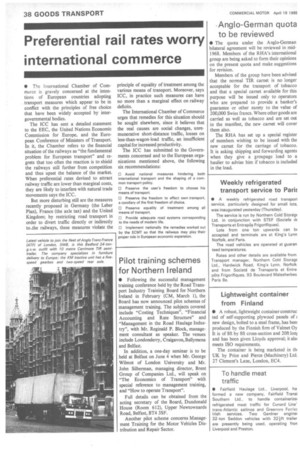Preferential rail rates worry international commerce
Page 40

If you've noticed an error in this article please click here to report it so we can fix it.
• The International Chamber of Commerce is gravely concerned at the intentions of European countries adopting transport measures which appear to be in conflict with the principles of free choice that have been widely accepted by intergovernmental bodies.
The ICC has sent a detailed statement to the EEC, the United Nations Economic Commission for Europe, and the European Conference of Ministers of Transport. In it, the Chamber refers to the financial situation of the railways as "the fundamental problem for European transport" and regrets that too often the reaction is to shield the railways still further from competition and thus upset the balance of the market. When preferential rates devised to attract railway traffic are lower than marginal costs, they are likely to interfere with natural trade movements says the ICC.
But more disturbing still are the measures recently proposed in Germany (the Leber Plan), France (the axle tax) and the United Kingdom; by restricting road transport in order to divert traffic directly or indirectly to.the railways, these measures violate the principle of equality of treatment among the various means of transport. Moreover, says ICC, in practice such measures can have no more than a marginal effect on railway deficits.
The International Chamber of Commerce urges that remedies for this situation should be sought elsewhere, since it believes that the real causes are social changes, unremunerative short-distance traffic, losses on less-than-wagon-load traffic, an insufficient capital for increased productivity.
The ICC has submitted to the Governments concerned and to the European organizations mentioned above, the following six recommendations:
o Avoid national measures hindering both international transport and the shaping of a common transport policy.
o Preserve the users freedom to choose his means of transport.
o Preserve the freedom to effect own transport, a corollary of the first freedom of choice.
o Preserve equality of treatment among all means of transport.
O Provide adequate road systems corresponding to the needs of modern life.
E Implement nationally the remedies worked out by the ECMT so that the railways may play their proper role in European economic expansion.








































































































































